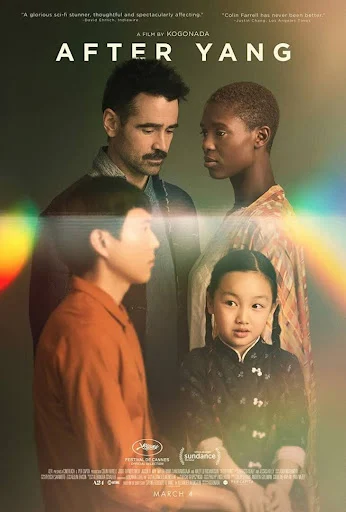Black Mirror (2023; Season 6, E1-5)Created by: Charlie BrookerA mirror reflects the light wavelength that hits it. That is what it is meant to do. Logically a black mirror cannot exist. A mirror that absorbs light (appears black) will not be much of a mirror.
The way I look at a black mirror is that it is like a two-way mirror. When the viewer views a conventional mirror, he sees a reflection of himself and his antics, plain and clear. In a black mirror, however, unbeknownst to him, his duties, actions, inactions, body language, facial twitches and grimaces are noted, not by himself, but by a third party. A two-way mirror is a misnomer, actually. It cannot be viewed both ways, as it is reflective on one side and transparent on the other. It gives the appearance of a mirror to those who see the reflection but allows people on the clear side to see through, as if at a window.
Interestingly, even a conventional mirror is viewed with scorn by traditional societies. They were worried that it may suck part of their souls. The same goes for cameras and photographs capable of reproducing an accurate representation of a person.
Most modern gadgets which transmit information come with a monitor that can be gazed into. Since its introduction, whether in a television set, desktop screen, mobile phone or i-pads, people have been worried about mind control by those in power.
There is no doubt that modern devices are capable and are already collecting data on human behaviour, spending patterns, political leanings and predicted responses. We also know digital component providers can make calculated moves to trap and influence our decision-making and behaviours. Data on human predictability is now a saleable commodity.
Since the first season, the Black Mirror series has painted a bleak dystopian future for mankind, primarily due to technological advances. Man of the future had unwittingly signed away their liberty and freedom with disastrous outcomes. Essentially, thinking had been outsourced to artificial intelligence (AI). Human beings are 'moronised'.
This much-awaited season came out with a bang after a hiatus of four years. The scary thing is that, over the years, since the first episode's release in 2011, we are slowly seeing some of their predictions coming true. Drone technology, technology-based mercenaries, chatbot-controlled central administration and trivialisation of the human mind is slowly but surely materialising.
Boy, the new season came out with a bang with five episodes with different settings. The first two episodes deal with how TV streaming affects the day-to-day running of our lives. One includes the folklore of werewolf in it. Another two are set in the past but with a component of sci-fi. My favourite is 'Demon 79'. Set in 1979 UK, when the economy was in the doldrums, and racial discrimination was high. A lonely, bullied shop assistant has a demon manifest in front of her to offer a deal to save her from miseries. The catch is that she has to kill three people.
The episode 'Joan is Awful' is every netizen's nightmare. What if all our daily actions and inactions are digitalised and streamed for everyone else to judge? This could be a possible danger of quantum computing.
With so much documentation of crimes available in our archives, everybody can be a documentary maker. In 'Loch Henry', another engaging episode, the protagonists find out the hard way that sometimes our own backyard is not so squeaky clean.
With our lust to consume news on the trivialities of the rich and famous, we have created a fleet of money-hunger paparazzi who would at nothing for a fistful of dollars, not even to a werewolf attack in 'Mazey Days'.
As space travel becomes accessible to whoever can afford it, there is a lingering reluctance because of the long period of absence from loved ones. In an alternate 1969 universe, in 'Beyond the Sea', scientists devised a way to periodically transport a replica astronaut back to Earth. Unfortunately, trouble brews when one of them is murdered by a mob on Earth.
An engaging season, highly recommended, 4.5/5.
 It is the year 2074. Yes, the world is still around, and so is the human race. It has been over a century since Malaysia received its mandate to self-rule. Technically, we should be in a utopia with so much sunlight throughout the year and a chirpy tropical climate devoid of depressing, chilling winters or debilitating natural calamities. A potpourri of food options is available 24/7 at our fingertips and delivered to our doorsteps with easy-access drone servers. We should be the happiest people in the world. In reality, however…
It is the year 2074. Yes, the world is still around, and so is the human race. It has been over a century since Malaysia received its mandate to self-rule. Technically, we should be in a utopia with so much sunlight throughout the year and a chirpy tropical climate devoid of depressing, chilling winters or debilitating natural calamities. A potpourri of food options is available 24/7 at our fingertips and delivered to our doorsteps with easy-access drone servers. We should be the happiest people in the world. In reality, however…


.jpg)




_10111037_1673873673447.jpeg)












